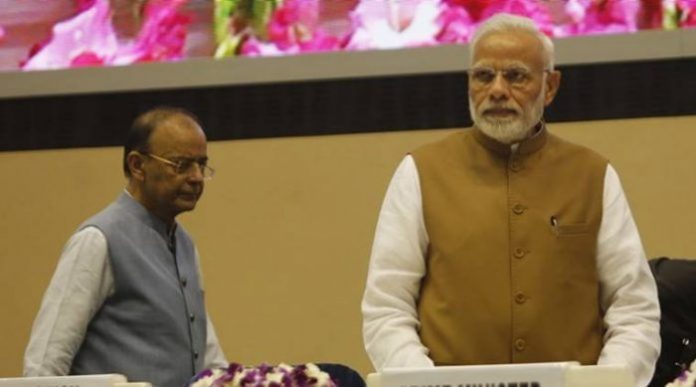New Delhi, November 06, 2018: The government Friday launched a national effort to make credit available to small businesses, alongside measures to boost fund flow to the Micro, Small & Medium Enterprises (MSME) amid a broader liquidity crunch.
The measures, announced by Prime Minister Narendra Modi, are aimed at providing GST-registered MSMEs access to cheaper credit by way of an interest subsidy on fresh loans, mandating state-owned companies to procure at least 25 per cent of their product requirements from smaller firms and lighter touch regulations for the MSMEs. These include filing of single common form for eight labour laws instead of two at present and a single approval for environmental clearance to establish a unit, instead of separate approvals needed as of now.
Modi called these steps his “Diwali gift” to MSME entrepreneurs. An allocation of Rs 6,000 crore for setting up 20 technology hubs and 100 centres as spokes to galvanise advancement of technology in the MSMEs was also announced.
Small business to get easier credit, faster approval, less red tape
These measures come when the government is engaged with banks to address the liquidity crunch in the markets. Senior officials at the Prime Minister’s Office also met the heads of leading state-owned banks on Friday. Two sources close to the development said that PMO officials discussed the liquidity situation and asked bankers to ensure ample liquidity for NBFCs — a big lender to the MSME segment.
MSMEs that are registered on the GST platform will get two per cent interest subsidy on fresh loans, while a website psbloansin59minutes.com has been started to provide sanction on loan up to Rs 1 crore within 59 minutes.
The portal assesses the creditworthiness of the applicant through data analysis of GST returns, tax returns and bank account statements. “Yeh naya Bharat hai, isme bankon ke baar baar chakkar lagana khatam (This is New India, here you don;t need to go to banks again and again for loans),” Modi told an audience comprising MSMEs from across the country.
The Prime Minister announced these measures while launching the MSME support and outreach programme, which will run for 100 days covering 100 districts. He said he will personally monitor this outreach programme.
MSME players present at the meeting said cheaper credit and ease in obtaining environmental clearances are the steps that will help them the most. “Right now I have run after government officials to obtain environment and establishment approvals. That should become easier with these changes,” said an entrepreneur operating in the pharma sector.
For exporters who receive loans in the pre-shipment and post-shipment period, an increase in interest rebate from 3 per cent to 5 per cent was announced.
These measures are being planned to improve credit flow to MSMEs where growth has been much lower than overall non-food credit growth. The Reserve Bank of India data on deployment of gross bank credit till August-end this year shows that credit to industry has grown by just 1.9% year-on-year, and, within this broad category, credit to micro and small enterprises has increased 2.6%, and to medium enterprises by 6.5%.
In contrast, credit to the services sector has posted a phenomenal 26.7% growth, while overall non-food credit has grown at 12.4 per cent. The MSME segment accounts for just about 6% of the gross bank credit.
The bankers’ meeting with the PMO comes after meetings between Finance Ministry officials and RBI failed to arrive at any resolution as the RBI felt that there was enough liquidity in the market and credit growth remains healthy.
NBFCs are the major source of funds for MSMEs and a credit squeeze could adversely affect loan availability. With nearly Rs 1.5 lakh crore of debt papers of NBFCs coming up for redemption in November and another Rs 75,000 crore in December, the government is worried that more defaults could create a downward spiral in the markets.
The liquidity squeeze for the NBFCs started after Infrastructure Leasing & Financial Services defaulted on a series of its debt obligations. The government is asking the banks to support the NBFCs in order to ease the stress. November is the crucial month since large redemptions of NBFC papers are lined up each week.
Apart from steps to improve credit flow, Modi announced measures to ease rules, regulations and procedures for the MSMEs. Besides the filing of single common form for eight labour laws and a single approval for environmental clearance, the package included plans for the creation of special clusters for MSMES in the pharma sector for which the government will bear 70 per cent of the total cost.
To eliminate the ‘Inspector Raj’ for the MSMEs, the government announced that inspectors can only visit factories and premises of such firms through random technology-based allotment.
After the visit, inspectors need to publish their report within 48 hours. Modi said MSMEs are the second-largest employment generators after the agriculture sector and India is ready to join the Fourth Industrial Revolution based on the strength of MSMEs.
To improve the cash flow cycle of MSMEs, all companies with a turnover more than Rs 500 crore will have to compulsorily come on board the Trade Receivables e-Discounting System (TReDS). Joining this portal will enable entrepreneurs to access credit from banks, based on their upcoming receivables, which they can show to banks and receive short terms funds against.
To provide better market access to MSMEs in the government procurement process, public sector companies have been asked to compulsorily procure 25 per cent, instead of 20 per cent of their total purchases, from MSMEs. Of the 25 per cent procurement mandated from MSMEs, 3 per cent must now be reserved for women entrepreneurs.
All public sector companies have been mandated to register on the GeM portal (Government e-Marketplace) through which they can source their requirements. A total of 1.5 lakh suppliers comprising 40,000 MSMEs are currently registered with GeM.
The government has also amended the Companies Act through an Ordinance, under which, for minor violations, the entrepreneur will no longer have to approach the Courts, but can correct them through simple procedures.
The government has proposed to define MSMEs on the basis of turnover, instead of the existing practice of defining them on the basis of investment in plant and machinery.
Businesses with revenue of Rs 5 crore are proposed to called a micro enterprise, those with sales between Rs 5 crore and Rs 75 crore are to be deemed as small enterprises. Businesses with revenue between Rs 75 crore and Rs 250 crore are to be classified as medium-sized enterprises.
The Micro, Small and Medium Enterprises Development (Amendment) Bill, 2018 for changing the definition is currently pending in Parliament.The government Friday launched a national effort to make credit available to small businesses, alongside measures to boost fund flow to the Micro, Small & Medium Enterprises (MSME) amid a broader liquidity crunch.
The measures, announced by Prime Minister Narendra Modi, are aimed at providing GST-registered MSMEs access to cheaper credit by way of an interest subsidy on fresh loans, mandating state-owned companies to procure at least 25 per cent of their product requirements from smaller firms and lighter touch regulations for the MSMEs. These include filing of single common form for eight labour laws instead of two at present and a single approval for environmental clearance to establish a unit, instead of separate approvals needed as of now.
Modi called these steps his “Diwali gift” to MSME entrepreneurs. An allocation of Rs 6,000 crore for setting up 20 technology hubs and 100 centres as spokes to galvanise advancement of technology in the MSMEs was also announced according to the reports published in informalnewz.com.
Small business to get easier credit, faster approval, less red tape
These measures come when the government is engaged with banks to address the liquidity crunch in the markets. Senior officials at the Prime Minister’s Office also met the heads of leading state-owned banks on Friday. Two sources close to the development said that PMO officials discussed the liquidity situation and asked bankers to ensure ample liquidity for NBFCs — a big lender to the MSME segment.
MSMEs that are registered on the GST platform will get two per cent interest subsidy on fresh loans, while a website psbloansin59minutes.com has been started to provide sanction on loan up to Rs 1 crore within 59 minutes.
The portal assesses the creditworthiness of the applicant through data analysis of GST returns, tax returns and bank account statements. “Yeh naya Bharat hai, isme bankon ke baar baar chakkar lagana khatam (This is New India, here you don;t need to go to banks again and again for loans),” Modi told an audience comprising MSMEs from across the country.
The Prime Minister announced these measures while launching the MSME support and outreach programme, which will run for 100 days covering 100 districts. He said he will personally monitor this outreach programme.
MSME players present at the meeting said cheaper credit and ease in obtaining environmental clearances are the steps that will help them the most. “Right now I have run after government officials to obtain environment and establishment approvals. That should become easier with these changes,” said an entrepreneur operating in the pharma sector.
For exporters who receive loans in the pre-shipment and post-shipment period, an increase in interest rebate from 3 per cent to 5 per cent was announced.
These measures are being planned to improve credit flow to MSMEs where growth has been much lower than overall non-food credit growth. The Reserve Bank of India data on deployment of gross bank credit till August-end this year shows that credit to industry has grown by just 1.9% year-on-year, and, within this broad category, credit to micro and small enterprises has increased 2.6%, and to medium enterprises by 6.5%.
In contrast, credit to the services sector has posted a phenomenal 26.7% growth, while overall non-food credit has grown at 12.4 per cent. The MSME segment accounts for just about 6% of the gross bank credit.
The bankers’ meeting with the PMO comes after meetings between Finance Ministry officials and RBI failed to arrive at any resolution as the RBI felt that there was enough liquidity in the market and credit growth remains healthy.
NBFCs are the major source of funds for MSMEs and a credit squeeze could adversely affect loan availability. With nearly Rs 1.5 lakh crore of debt papers of NBFCs coming up for redemption in November and another Rs 75,000 crore in December, the government is worried that more defaults could create a downward spiral in the markets.
Informalnewz.com further added that the liquidity squeeze for the NBFCs started after Infrastructure Leasing & Financial Services defaulted on a series of its debt obligations. The government is asking the banks to support the NBFCs in order to ease the stress. November is the crucial month since large redemptions of NBFC papers are lined up each week.
Apart from steps to improve credit flow, Modi announced measures to ease rules, regulations and procedures for the MSMEs. Besides the filing of single common form for eight labour laws and a single approval for environmental clearance, the package included plans for the creation of special clusters for MSMES in the pharma sector for which the government will bear 70 per cent of the total cost.
To eliminate the ‘Inspector Raj’ for the MSMEs, the government announced that inspectors can only visit factories and premises of such firms through random technology-based allotment.
After the visit, inspectors need to publish their report within 48 hours. Modi said MSMEs are the second-largest employment generators after the agriculture sector and India is ready to join the Fourth Industrial Revolution based on the strength of MSMEs.
To improve the cash flow cycle of MSMEs, all companies with a turnover more than Rs 500 crore will have to compulsorily come on board the Trade Receivables e-Discounting System (TReDS). Joining this portal will enable entrepreneurs to access credit from banks, based on their upcoming receivables, which they can show to banks and receive short terms funds against.
To provide better market access to MSMEs in the government procurement process, public sector companies have been asked to compulsorily procure 25 per cent, instead of 20 per cent of their total purchases, from MSMEs. Of the 25 per cent procurement mandated from MSMEs, 3 per cent must now be reserved for women entrepreneurs.
All public sector companies have been mandated to register on the GeM portal (Government e-Marketplace) through which they can source their requirements. A total of 1.5 lakh suppliers comprising 40,000 MSMEs are currently registered with GeM.
The government has also amended the Companies Act through an Ordinance, under which, for minor violations, the entrepreneur will no longer have to approach the Courts, but can correct them through simple procedures.
The government has proposed to define MSMEs on the basis of turnover, instead of the existing practice of defining them on the basis of investment in plant and machinery.
Businesses with revenue of Rs 5 crore are proposed to called a micro enterprise, those with sales between Rs 5 crore and Rs 75 crore are to be deemed as small enterprises. Businesses with revenue between Rs 75 crore and Rs 250 crore are to be classified as medium-sized enterprises.
The Micro, Small and Medium Es nterpriseDevelopment (Amendment) Bill, 2018 for changing the definition is currently pending in Parliament.




























